Kazuchiyo lived at Gyoe for five years after that, and there are a great number of stories I could share with you about his life then. Though he was never allowed to journey beyond the limits of the surrounding town, there are plenty of adventures both exciting and mundane a teenaged lord can entertain himself with during castle life. More mundane ones than exciting, perhaps, but enough to fill a pillow book. He studied and trained among Sakka’s finest, explored every corner of the castle, learned the habits of its occupants both high and low. By necessity he was obedient and humble wherever called upon, never so much as before his father. In all things he dedicated himself with impeccable conviction toward the secret goal he carried, ears ever keen for news from the western border.
And I would happily sing praises for his youthful fortitude, but to Kazuchiyo, he was still a prisoner. He was a spy among his enemy, a shameful spectacle who was too weak to do anything but bow and grovel before his family’s killers.
So let us not dwell on those painful years and resume instead in the spring of 1487, just after Kazuchiyo reached eighteen years of age. He had grown into an admirable man by any measure: handsome, with thick, coal-black hair and eyes bright as gold; clever, with wits nearly sharp enough to rival a fox; even-tempered to the point of stoicism. Even if some among Aritaka’s ranks suspected he still harbored resentment toward his situation, he gave them no reason to act on it. He woke before sunrise every morning and hurried to complete his tasks with the utmost proficiency, and on one such morning, after a night of rainy sleeplessness, those duties conveyed him to the chamber of Lady Satsumi.
Satsumi greeted him warmly, as she always did, but her face was still pale after a week of illness. “I have breakfast for us,” she said as she swept him inside, to where two trays awaited them. “Come sit with me, Kazu. Forgive me if I keep you in suspense for a while, but I’ve missed your company and I’m determined to do what I can to prolong it.”
“My company is yours whenever you require it,” Kazuchiyo replied as they took their seats. Satsumi’s maid was already kneeling nearby, ready to serve them, and he acknowledged her with a short bow of his head. She tried to hide a smile. “I hear you’re still recovering, but you look very well.”
“I wish you would smile when you say things like that,” Satsumi replied, though already there bloomed a bit more color in her cheeks. “Flattery is far more effective that way.”
“It’s only the truth,” Kazuchiyo said as the maid set out bowls of rice and soup for them. “Given the circumstances, it might be insensitive for me, in particular, to offer flattery.”
Satsumi’s eyes lost some of their shine as they flicked away. “Once you’re finished, you can leave us,” she told the maid. “I’ll call if you’re needed.”
“Yes, Lady Satsumi.”
The maid hurried to complete her duties, and with everything poured and prepared, she showed herself out. Kazuchiyo and Satsumi each took a moment of silence to sip their tea and be sure of no more lingering ears before the later spoke.
“You’ve grown so careful in your words, Kazu,” she said. “You ought to be commended.”
“I’m not a boy any longer, Lady Satsumi,” he replied, helping himself to the rice first. “I understand the position you’re in. Do you believe your illness this time to have come from the same source as before?”
“No.” Though Satsumi did not look to have much appetite, she made an effort to nibble at the vegetables. “No, I am well convinced it was that horse-faced friend of yours,” she said breezily. “I don’t suppose you could reassure her from me that I mean you no harm? Even if I was left alone long enough to bare one of these children it would be quite a long time before we knew for certain if Lord Aritaka would accept them. All this meddling is frightfully premature, and speaks to, frankly, an embarrassing level of insecurity on her part. And dear Lady Aritaka, for that matter.”
Kazuchiyo continued to watch her as he ate, and could not help but glance down to the loose fit of the obi across her stomach. “Master Iomori is very protective of me,” he agreed. “But that doesn’t always mean she listens to me. Still, I’ll do what I can.”
“I would appreciate it.” Satsumi paused in her eating to face him with greater seriousness. “You believe it, don’t you, Kazu?” she asked. “That I mean you no harm?”
“It’s as you say. Even if you have a fine son, Lord Aritaka would not claim him as an heir until he came of age. As long as I prove myself to him before then, he can have no reason to choose a child of yours over me. ” Kazuchiyo returned her gaze with a smile. “As far as I can see, I’m in no danger from you at all, Lady Satsumi.”
Satsumi smiled as well, though her eyes were in conflict. Kazuchiyo did believe that it would grieve her to do him harm. “Nor I you,” she said. “I’m very fond of you, Kazu.”
She meant it, and he believed it, even if that mattered very little in the grand scope of their peculiar friendship. Still, with that reassurance they could continue a while longer.
“When we’re finished,” Satsumi changed the subject as they ate, “would you mind playing for me?”
“Only if you fulfill a request of mine first,” said Kazuchiyo.
Satsumi made a long-suffering face as she reached into the front of her robe. “I supposed I’ve held you in suspense long enough,” she said, back to her teasing. She pulled out a folded strip of paper and flipped it open with one hand while continuing to eat. Kazuchiyo continued his meal as well, though his attention was fixed very sharply on the letter as she began to read.
“To my dearest sister,” relayed Satsumi with an effort toward drama. “The days here at Ninari Castle continue to be fraught with trials. Though I do not wish to alarm you… Hm, he rattles on and on.” Satsumi paused to sip from her tea—it would seem she was not so finished with her play at suspense after all. Kazuchiyo forced himself to continue eating as if his heart wasn’t rising slowly up his throat.
“Ahh, here we are,” she said at last, and she flashed Kazuchiyo a smirk. “As for Ebara Motonobu, who you know better as Yagi-douji, he is as ferocious as ever. General Utsukawa has ordered him to assist in the extra fortifications to the castle, and the workers claim to have seen him hoisting the beams across his shoulders. Every day I am more convinced he lives up to his nickname! Just ten days ago he brought a man before the general he claimed to have been a Kibaku spy, and on orders beat the man to death. They say he looked like a vision of hell! Even the blacksmith promises to craft him a proper club. I do not know why…”
Satsumi trailed off with a chuckle. “He goes on to scold me for asking after such a terrible brute so often. His calligraphy is atrocious—I do believe his hand was shaking when he wrote this.”
“May I see?” Kazuchiyo asked, with enough insistence to elevate request to demand. With eyebrows raised Satsumi passed it to him, and he poured over the text. The tremble in each character made it extremely easy for him to picture Yagi poised over the helpless carcass of an enemy scout, blood speckling his bare skin. The gleam of his eyes sharp with malice was ever at the front of Kazuchiyo’s memory.
“I’m happy for you,” Satsumi said. “I know you’ve worried after him, but from the sound of it, he hasn’t changed one bit.”
Kazuchiyo read over the rest of the letter as well, absorbing all the information he could from what was said, and almost as importantly, what was not. He then reread the description of Yagi twice over before returning the letter to its recipient. “I am very grateful to your brother,” he said. “And to you, for sharing his letters with me.”
“I would ask him to illustrate it for you,” Satsumi teased, “but from the sound of it, his courage would be even less up to the task than his artistry.” She tucked the letter back into her kimono. “Once the construction on the castle fortifications is finished, I’m certain that Lord Aritaka will want to survey the work personally. You ought to ask that he take you with him.”
Kazuchiyo flushed with heat at the thought. “Leave Gyoe?”
“He will have to allow it at some point,” Satsumi reasoned. “What good does it do him to have an heir that has seen nothing of the world? Besides, if he starts a war with Kibaku Province, it will be yours to finish.”
“Let us hope it won’t come to that,” Kazuchiyo said, distracted, and they continued their meal.
Once they had finished, Kazuchiyo fulfilled his promise, but he did not play for her in the room. She fetched the wooden flute from its case for him, and he opened the chamber windows to the south. On feet light as a cat’s he stepped out onto the tiled roof and took in a deep breath of morning air still crisp from rain. He watched sunlight stream through gaps in the cloud cover and highlight rooves of the town below. Every day it became a little harder to remember the view from the castle he’d been born in.
Kazuchiyo sat on the edge of the sil and played. The sound of the flute rang clear from the lower keep, and he liked to think that samurai and peasant alike were turning their eyes upward in search of him. As often as he could, he reminded Gyoe’s citizenry that he lived among them. He played lullaby’s from his youth, songs that had drifted to him from the river villages, melodies that only the dragons would know—would even know that only a dragon would know. He wanted the voice of his mother in their ears even if they weren’t aware.
When Kazuchiyo paused to catch his breath, he spotted a caravan approaching Gyoe from the road to the southeast, comprised of over two dozen horses and their riders bearing Aritaka banners. He continued to watch them as he resumed his music, up until Satsumi reached through the window to tug his shoulder.
“You’re being summoned,” she said, indicating the chamber’s entrance, where a young page was waiting.
“I’ll come back later,” Kazuchiyo said as he returned the flute to her, “so I can finish playing for you.”
“You’ve played enough for me,” Satsumi replied. “Look after yourself some, Kazu.”
“I will. And someday when I am lord of Gyoe, I’ll make sure you’re looked after, too.”
He meant it. She didn’t believe it, though through no fault of his, and she wished him good luck as he departed with the page.

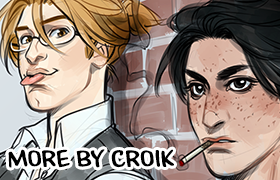

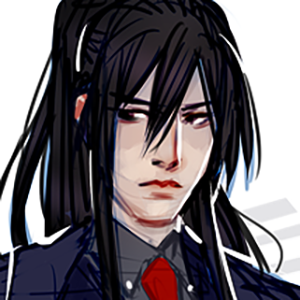
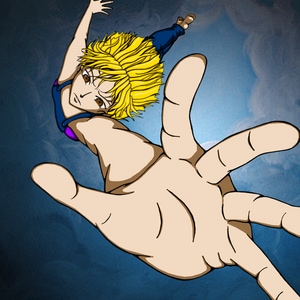







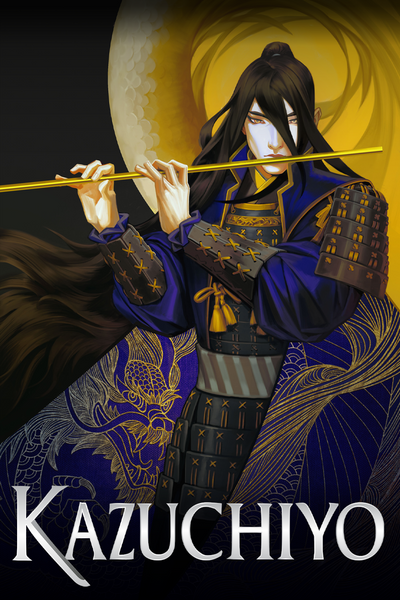
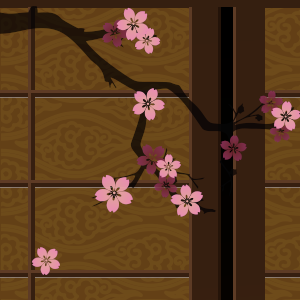
Comments (6)
See all